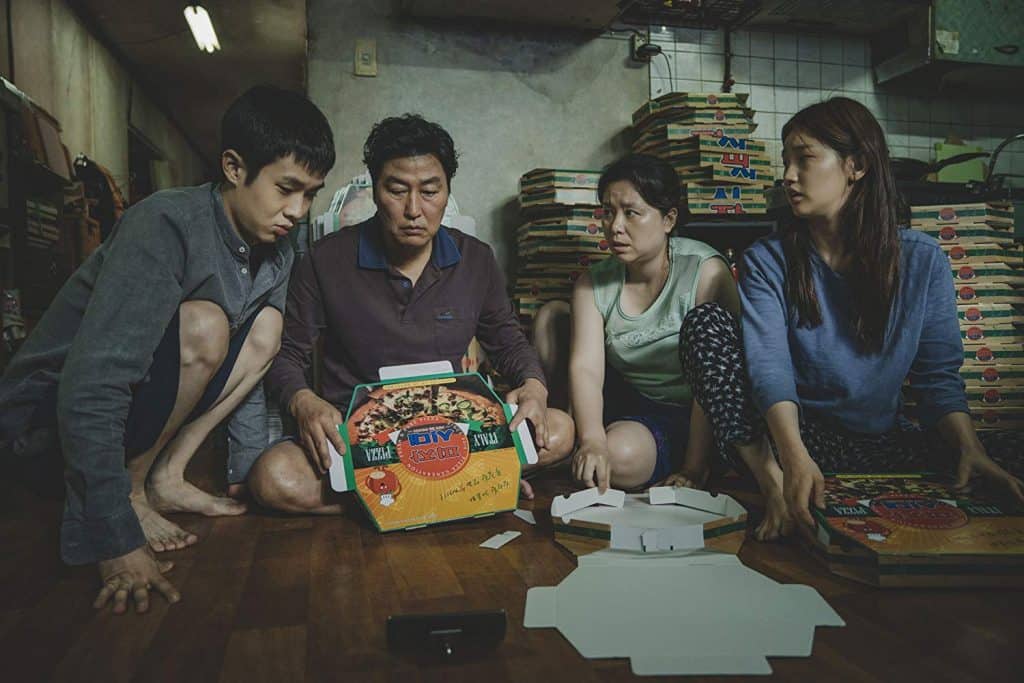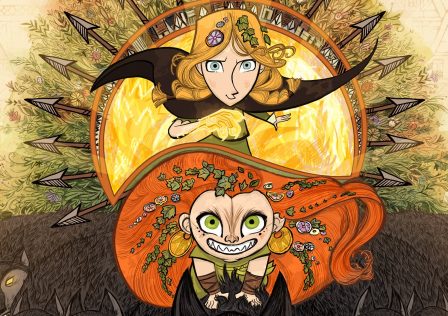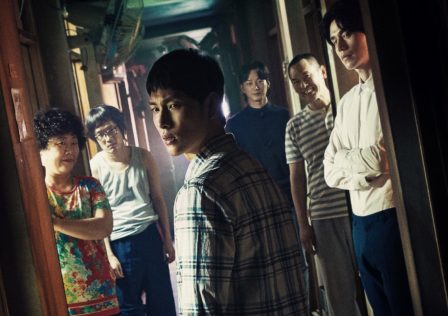Read PART 1 here.
NO-TURNING-BACK MAJOR SPOILERS AHEAD
There is a pivotal scene in Bong Joon-Ho’s Parasite that neatly demarcates the first act from the second and serves as a premonition for the calamity that is yet to come: the Parks are away for a camping trip and the Kims finally have the Park house all to themselves. The Kims nap, chill, watch TV and enjoy a bubble bath, sample the food and drink of their hosts, and luxuriate in being surrogate Parks for a day. Everything is just so darn idyllic, we can just foretell that shit is bound to happen.
Without warning, lightning and thunder jar the Kims from their reverie before the buzzer to the security entrance resounds through the house. The housekeeper they had earlier successfully displaced — Moon-gwang (Lee Jeong-eun) — is at the door and she asks to be let in, claiming she had inadvertently left something behind when she was dismissed so quickly by Mrs Park. The re-emergence of the housekeeper then sets off a chain of events that spiral quickly out of control, resulting in mayhem, violence and eventually, death.

A new character is introduced: it turns out that Moon-gwang has returned for her husband, Geun-se (Park Myeong-hoon), who is trapped in the nether regions of the Park residence. Both husband and wife have been leeching off the Parks for more than four years, the latter having no knowledge of Geun-se’s presence. While Moon-gwang keeps house above ground, her husband spends his days holed up in the sub-basement, a place that is even deeper underground than the basement where the Parks store their stuff.
Namgoong, the architect and original owner of the house, had constructed this subterranean space as a refuge from creditors or North Korean nuclear attacks. But he was so embarrassed of having done so that he did not tell the Parks when he sold the property to them years later. Moon-gwang is privy to this information because she was Namgoong’s housekeeper before she was bequeathed to the Parks. Later on, when her husband fell into financial straits and was on the run from loan sharks, she squirreled him away in the safest place she knew: the Park’s secret bunker.
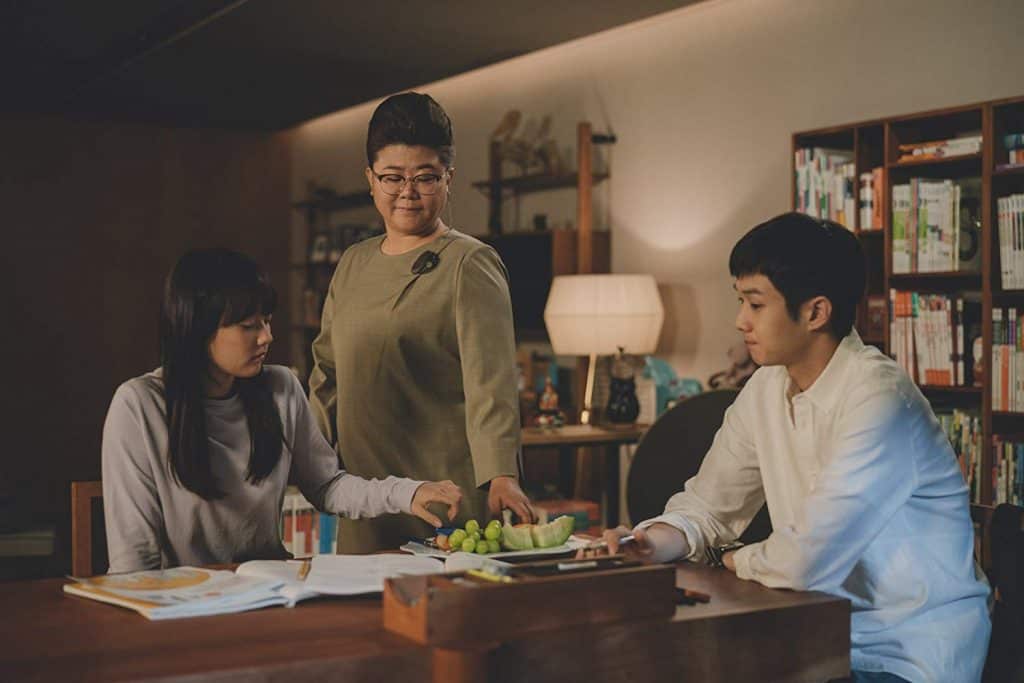
The introduction of Moon-gwang and Geun-se — whom I shall call The Couple from here on out — complicates the idea of parasites in the film because there are now two sets of parasites and they are far from alike. For the purposes of my analysis, I shall classify the parasites in the film into two types: aspirational parasites (The Kims) and legacy parasites (The Couple). What separates the two is how they envision their future.
The Kims are most assuredly parasites of the first type because they are parasites with dreams and ambitions. In the pivotal scene mentioned earlier, after the Kims round off their evening with hard liquor and raucous banter, trash-talking leads to wishful thinking. Ki-woo imagines himself married to the Park’s daughter and Mr Kim envisages his son living in Park’s huge house as a member of the family. In this scene, they are clearly not content to just live off their host; they aspire to advance beyond parasitism. This is why I consider them to be aspirational parasites.
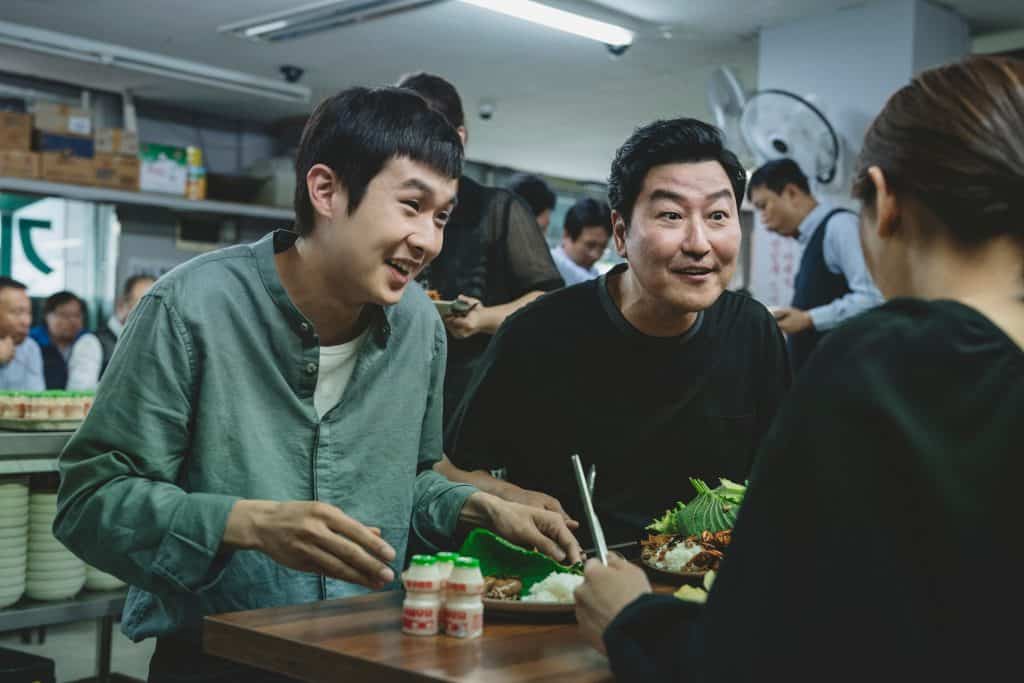
Legacy parasites, on the other hand, would not dream of disrupting such a mutually beneficial relationship with their host. If there were to be any disruption, it would likely be initiated by the host (as when Mrs Park laid off Moon-gwang) or caused by rogue parasites (such as the Kims).
Legacy parasites generally worship their host and hold him or her in high regard. This reverence for their host either stems from a shared value system and/or deep respect born of years of complete dependency. The Couple, for instance, feel that they are closely connected to their original host (architect Namgoong) because they share their host’s “creative spirit” and are able to appreciate his artistic genius, as reflected in the house he built. The Couple sees themselves as a different kind of parasite from the Kims, whom they deride as being “scumbags”, “cretins” and “Neanderthals”—clearly suggesting that the Kims are immoral, uneducated, and uncultured.
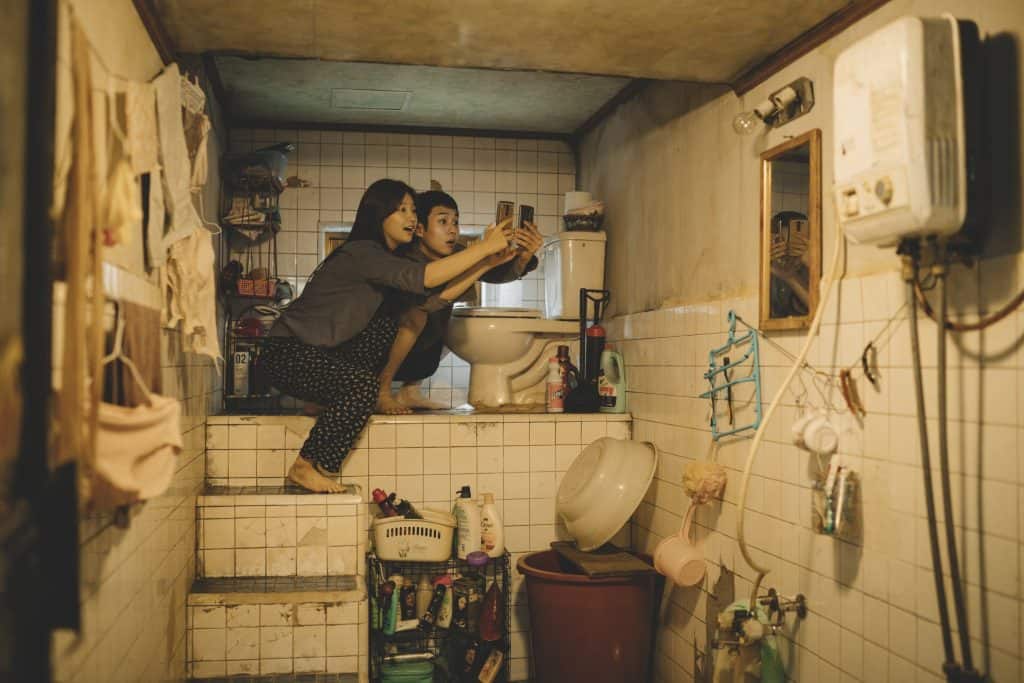
Geun-se, in particular, is so grateful to his host for housing and feeding him that he proudly shouts out that he loves and respects Mr Park, in front of Mr Kim. To show the depths of his deference, Geun-se even turns on the lights for Mr Park with switches in the sub-basement when the latter returns home from work each day, and sends cryptic messages of thanks to him using Morse Code. The Parks think these lights are sensor-operated but in fact, they are controlled by the ever-dutiful Geun-se. Legacy parasites like The Couple are comfortable being parasites and don’t have any plans to be anything else.
In contrast, aspirational parasites are planners; they are not content to be parasites for life because they were not born parasites and in fact, spent some years as free-living organisms, bolstered by jobs and financial ventures. From the Kims’ earlier conversations, we know that Mr Kim used to work as a driver and a valet; he also got involved in failed ventures, like the Taiwan king castella cake business—which was a real cake trend in South Korea around the time Bong wrote his script. Ki-woo was no slouch either, re-taking his university entrance exams not once, but four times.

Like the Kims, Geun-se used to be free-living too; he also got caught up in the same Taiwan cake business trend as Mr Kim, with dreams of striking it rich. When the South Korean economy faced a downturn with record-breaking unemployment rates, the Kims and Geun-se suffered similar fates. While the Kims eked out a living doing odd jobs, Geun-se borrowed money from loan sharks. When he was unable to repay them, his wife helped him disappear. To survive, he evolved to become a legacy parasite.
Legacy parasites are a unique class because they have evolved — often out of necessity or a lack of choice — to see their parasitic behaviours as part of their identity and even heritage, something to be proud of and to value. The world beyond the host world means nothing to them because they can no longer separate themselves from their host, and any memory they may have of a former life free from parasitism is permanently erased.
Geun-se’s evolution from being a hunted free-living man to a legacy parasite is best exemplified by the way he has set up his living space underground. He has filled it with photos of world historical figures and nostalgic paraphernalia that affirm his origins as a subterrestrial. He even tells Mr Kim he feels like he was born in the sub-basement and had his wedding here too, even though we know this cannot possibly be true. Geun-se has clearly reimagined a life for himself that is steeped in a history of his own making; he could never dream of leaving because to do so would mean a negation of his sense of self and his birthright.
Ultimately, legacy and aspirational parasites are trapped — whether willingly or not — but are unable to fathom that the root cause of their problems is the system of parasitism itself. They will never forge an alliance to dismantle a system that they have become too invested in and that gives them so much meaning and purpose. In the end, the death of one host—even if it is at the hands of a parasite—does not foretell the end of parasitism; it merely ensures the rise of others.

Watching this film made me reflect on my own country and marvel at how many parallels I could draw between Malaysia and the South Korea envisioned in Parasite. Broadly speaking, both our cultures are built upon the normalisation of social hierarchies and an acceptance of varying manifestations of parasitism. Call it what you will: patronage, cronyism, nepotism, corruption—these are practices cut from the same cloth. And all parasites need a patron, a benefactor, an influential figure with powerful connections—a host.
Political leaders make excellent hosts because their ascension to power necessitates the presence of a diversity of parasites. In Asia, in particular, such hosts have been known to support millions of parasites for decades—that is, if they are clever about maintaining a healthy balance of legacy and aspirational parasites. If Bong’s film taught me anything, it is this: the moment an aspirational parasite decides to see himself as a host, the entire ecosystem is bound to eventually unravel.
Disruptions to the ecosystem are imperative if we are to redress the imbalance of power resulting from decades of unquestioned parasitism. Indeed, aspirational parasites have an important role to play to this end. Yet, disruptions are merely that; they do not signal the end of parasitism per se. Instead, the ecosystem just realigns to allow for new hosts and new parasites to flourish—I learned this all too well, from observing Malaysia’s overthrow of a 61-year old political regime through the ballot box in 2018, followed by the creation of a new coalition government comprising aspirational and legacy politicians.
Unlike in the film, no blood was spilled this time.

C Nge makes it her mission to write about films that have the power to change the world: one heart, one mind at a time.
